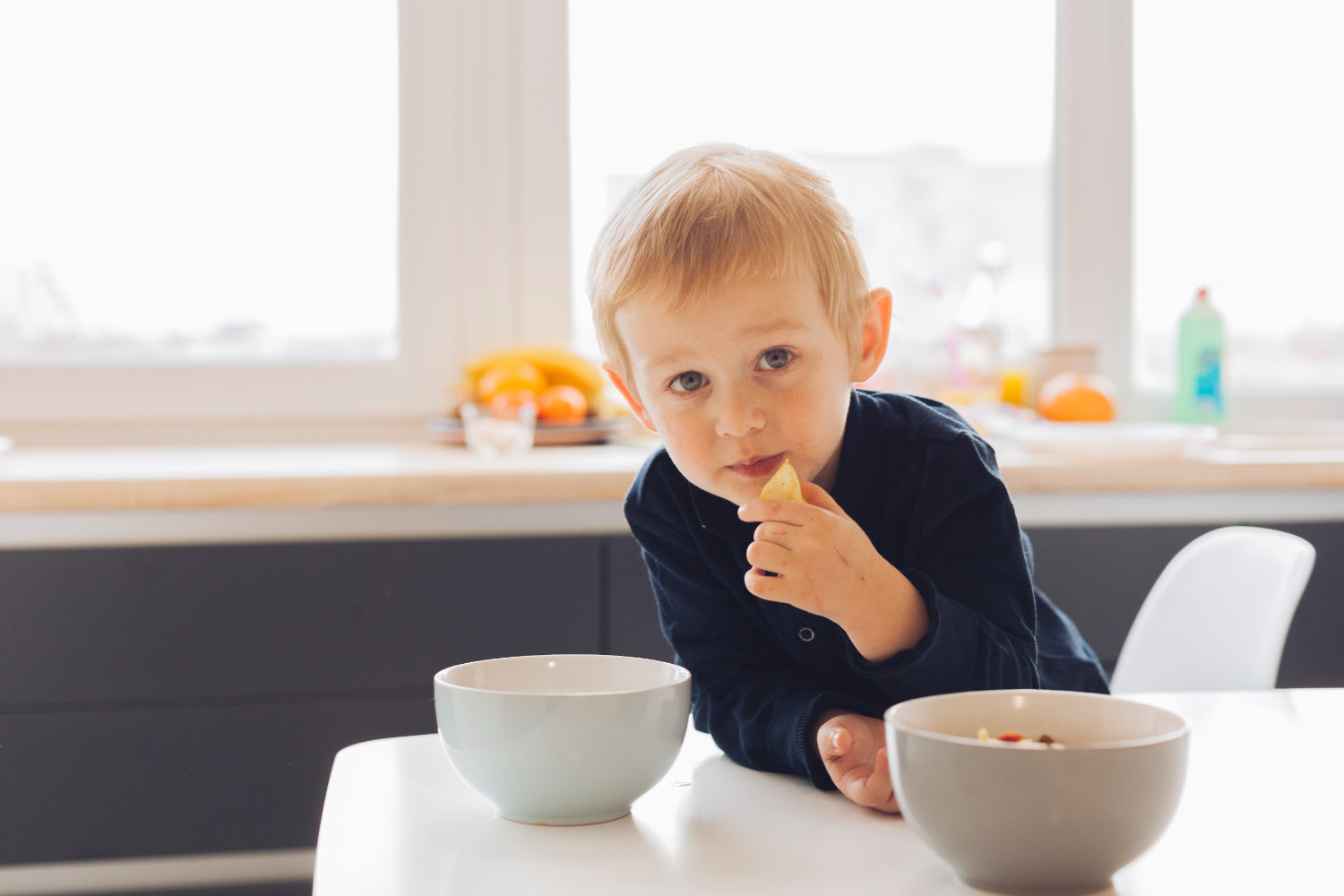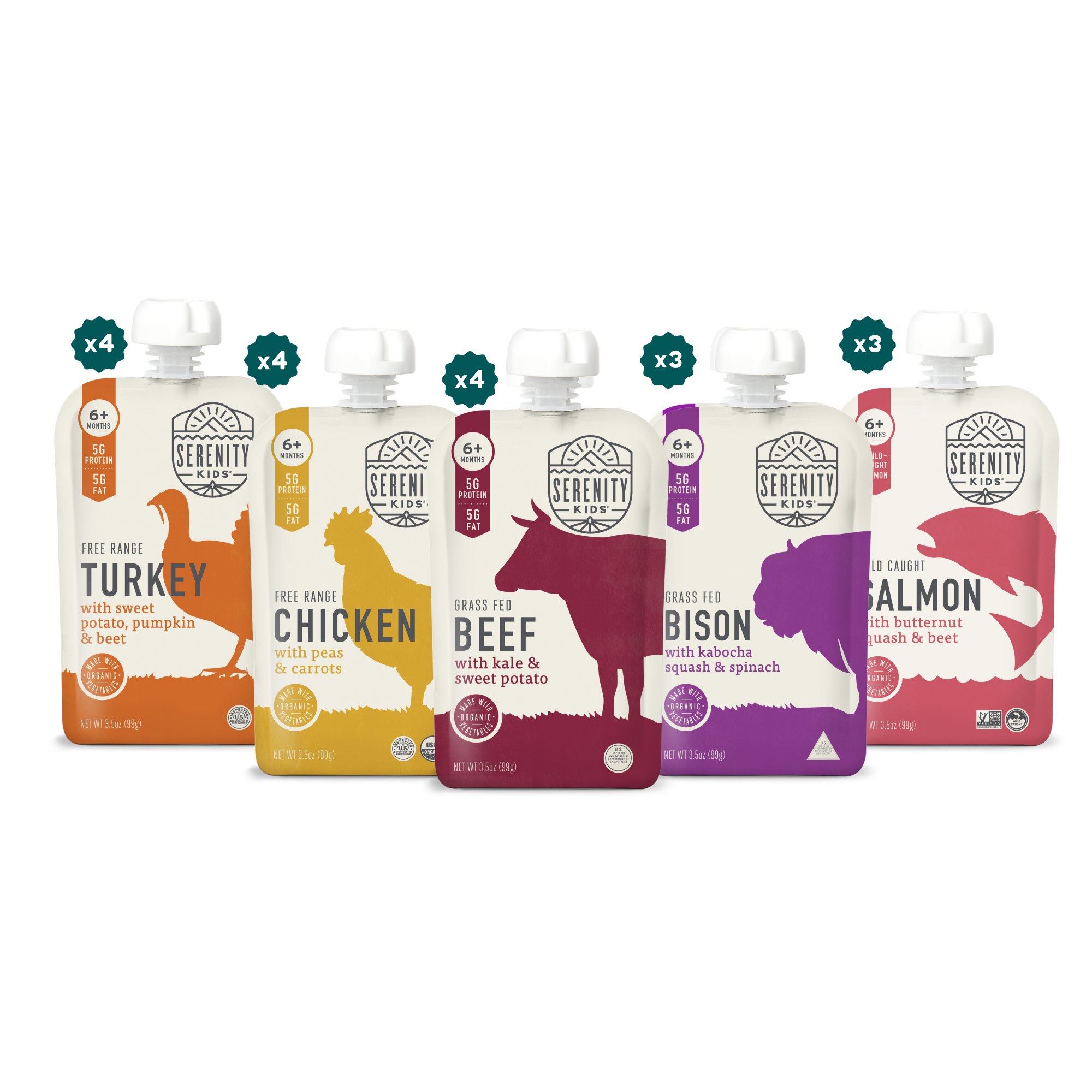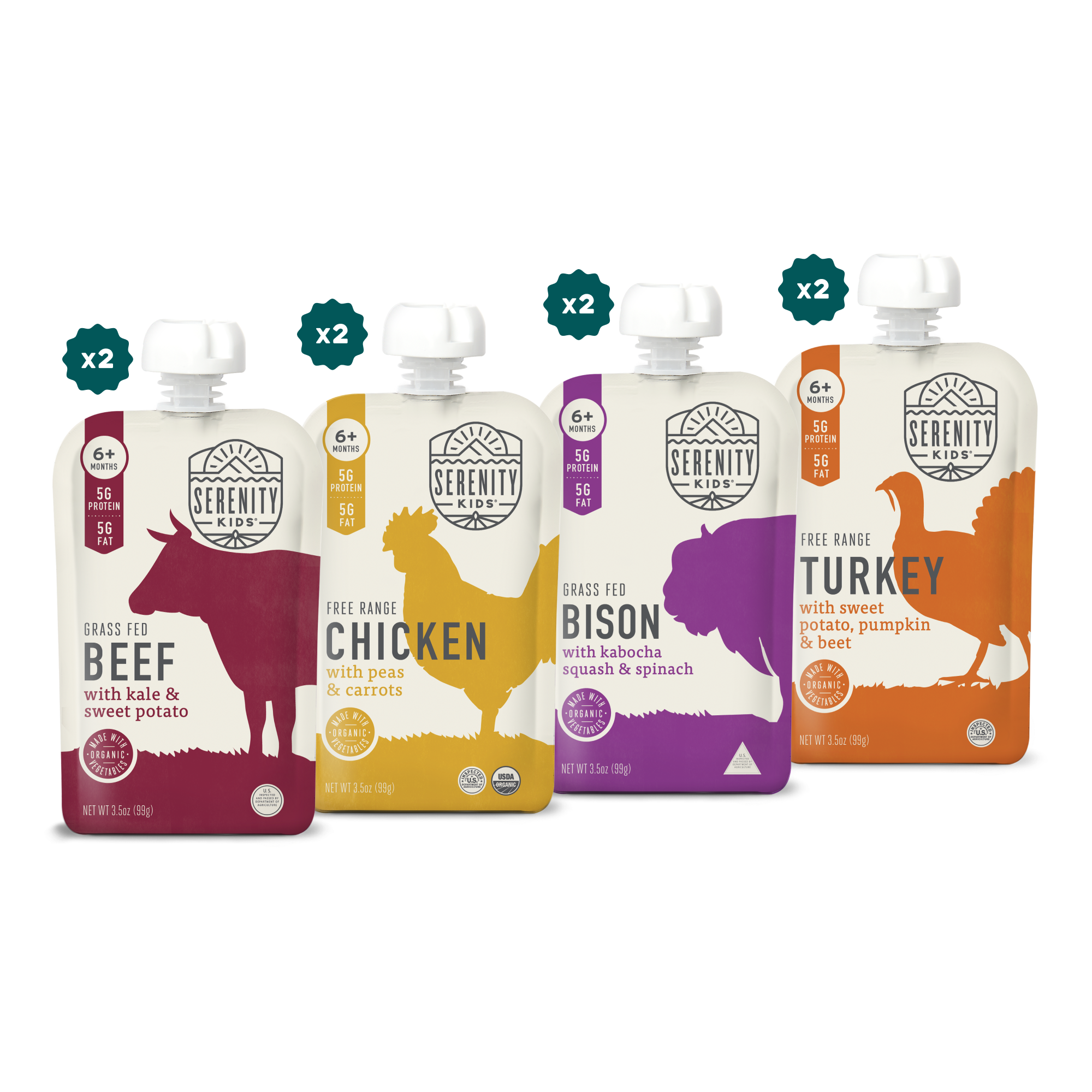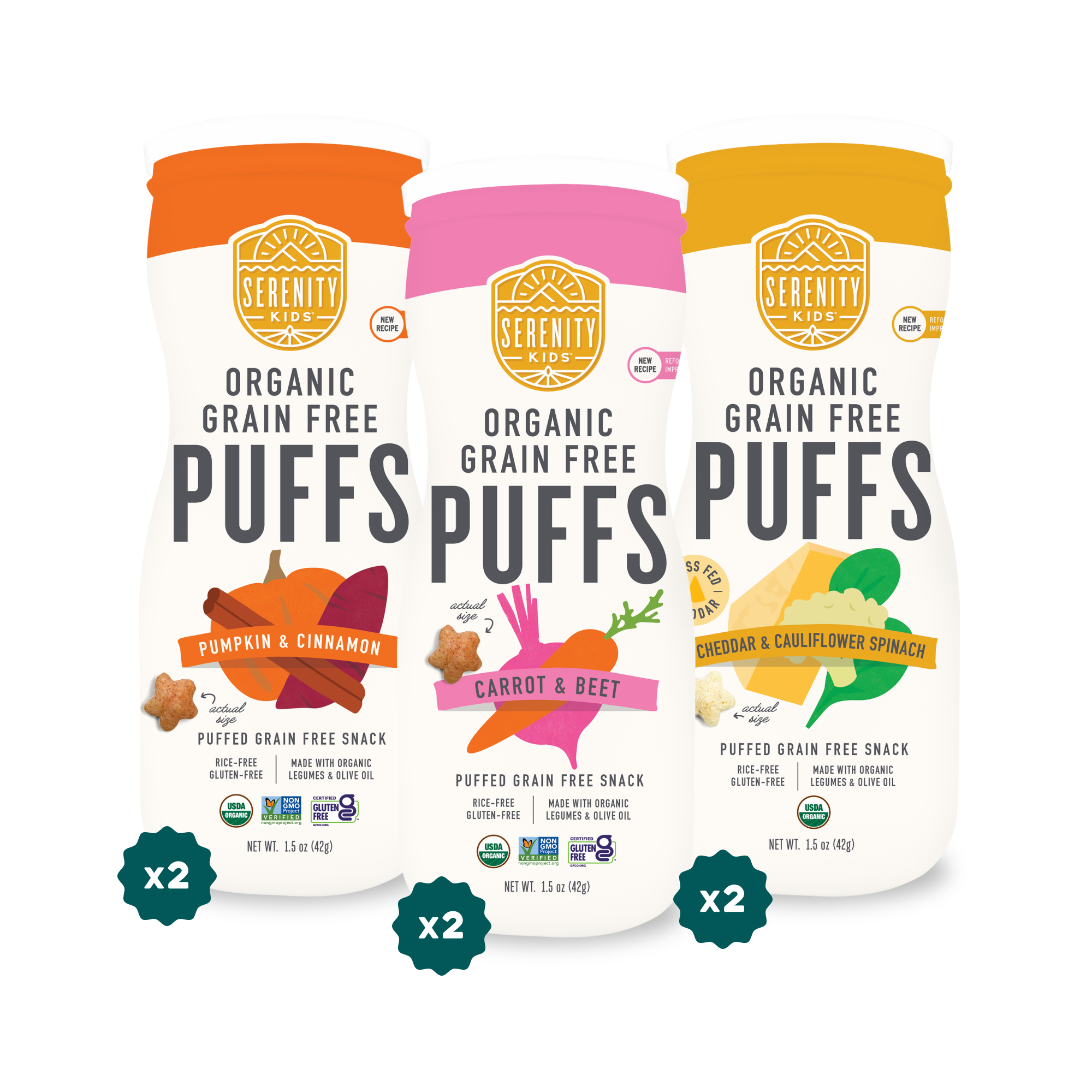TABLE OF CONTENTS
Written by Hillary Bennetts
December 16, 2024
How To Heal Your Gut And Support Mental Health

The connection between gut health and mental well-being is profound, especially for babies in their early stages of life. Learning how to heal your gut involves learning about the powerful link between the gut microbiome and overall development. A balanced gut can positively impact a baby’s mood, sleep quality, immune health, and emotional resilience, helping them thrive as they grow.
Nurturing your baby’s gut health involves simple but effective practices. Offering gut-friendly foods, establishing a calming sleep routine, and incorporating gentle movement are all key steps in fostering a balanced gut microbiome. These practices help support calmness, stable stress responses, and a strong immune system—essential elements for a healthy, happy baby.
Focusing on how to heal your baby’s gut from the start lays the groundwork for lifelong wellness. Explore these practical strategies for strengthening your baby’s gut and supporting their mental health, building a bright and resilient future for them.
Understand The Connection Between Your Baby's Gut and Mind!
Ever wonder why your happy, bubbly baby suddenly becomes a tiny whirlwind of tears and frustration? Chances are, it's more than just teething. Emerging science is revealing a fascinating truth: your baby's gut health can play a surprising role in their mental well-being and their immune system.
Many of us know about these connections as adults, but the reality is that they start far earlier than you might think - even when baby is still in the womb! There is a lot to learn about the gut-brain connection at all ages. It is an area that is still being actively studied by scientists, but we're sharing what we know as of now.
We're digging into the gut-brain connection and show you how nourishing your little one can unlock a world of calmer smiles and emotional balance. Buckle up, because it's time to explore the fascinating link between good food, happy tummies, and healthy minds!
Unraveling the Gut-Brain Axis

The gut-brain axis is a bidirectional communication network that connects the brain and the gastrointestinal tract. This means that the body can send signals both ways, so that the brain can influence intestinal activities, and the intestinal microbiota can influence the brain.
How the Microbiome Works: Understanding the diverse cast of characters in the gut microbiota
The human gut microbiome is made up of a diverse range of bacteria, fungi, and more. Some bacteria are considered "good" while others are "bad" (also known as pathogenic or harmful bacteria). All microbiomes will have both types of bacteria but the goal is to have a healthy balance so that the harmful bacteria are outnumbered by the helpful bacteria.
The good news is that you can support the good gut bacteria to help with the health of your baby's gut. Probiotic supplements contain beneficial strains of bacteria that can help to populate the gut. If your baby is eating solids, then fermented foods are another great option to add good bacteria.

In addition, prebiotic foods and supplements can feed the good bacteria so they continue to thrive and help maintain a healthy balance. Prebiotic foods, like fiber-filled veggies, act like a fertilizer in the gut garden. Begin Health also has a good flavorless supplement.
But how do you get an understanding of the composition of your baby's gut? Sometimes you have a sense that something is wrong, due to symptoms like digestive distress, eczema, diarrhea, or food intolerances. But even if you don't recognize symptoms, the best way to get a good look into the health of your baby's microbiome is by testing their stool. We love the Tiny Health Gut Health tests for infants and toddlers.
What is the Gut-brain connection?
Put simply, your brain talks to your gut, and your gut talks back. The expressions “gut feeling” or “going with your gut” actually describe a real connection between your gut and your brain.
Your brain communicates with the rest of your body through your nerves. Your nervous system is like a communication system. But more information passes between your brain and your gut than any other body system. In fact, there are more nerve cells in your gut than anywhere else in your body, except for your brain!
The Two-Way Street: How the gut talks to the brain and vice versa
We know that gut health influences so many aspects of health, from digestion to immunity. But supporting gut health also supports mental health. It might seem far-fetched for a little one, but there is no age too young to start supporting emotional well-being. Of course, this can be done both through gut health and through your own actions and communication.
This is because bacteria that live in the gut are connected to the brain. Gut microbes produce or help produce many of the neurotransmitters (chemical messengers) that send messages between your gut and brain. They also produce other chemicals that can affect the brain through the bloodstream. In this way, the brain can affect the gut microbiome by altering its environment.
The enteric nervous system, a division of the autonomic nervous system, is a key player in the connection between the gut and the brain. It is a complex neural network that operates within the gastrointestinal (GI) tract and controls its digestive functions. Since it can operate somewhat independently from your brain and central nervous system, some scientists refer to it as a “second brain”.
The main nerve making the connections between the gut and the brain is called the vagus nerve. It conveys sensory information about the conditions inside your gut from your enteric nervous system to your brain. It then transmits motor signals from your brain back to your gut.
The whole system is interconnected, so emotions that cause anxiety and perceived stress can influence the gut. For example, you might notice that new or stressful situations like travel or routine changes result in constipation in your little one.
How a Balanced Gut Can Impact Your Baby’s Mood and Behavior

A balanced gut is more than just good digestion; it plays a significant role in a baby’s mood, emotional stability, and overall mental health. A healthy gut microbiome, or the diverse community of gut bacteria, helps establish a strong gut-brain axis—the communication network between the gut and brain—critical for a baby’s developing mental and emotional state. Here’s how gut health can influence behavior and mood in babies:
1. Mood and Emotional Stability
The gut microbiome produces key amino acids and neurotransmitters that affect brain function. Studies show that imbalances in gut microbiota composition can increase symptoms associated with mood disorders, such as depression and anxiety. In babies, a balanced gut can help prevent early anxiety-like behaviors and promote emotional stability.
2. Stress Response
A healthy microbiota gut-brain axis supports resilience against chronic stress. Babies with a balanced gut microbiome have a more stable stress response, reducing potential anxiety scores later in life. Relative abundance of certain bacterial species in healthy controls shows a positive correlation with calmness, which may be disrupted in cases of chronic unpredictable mild stress or an unhealthy gut.
3. Cognitive Development
An optimized gut function aids in nutrient absorption, which is essential for brain development and overall health. Poor nutrient absorption due to gut imbalances or digestive symptoms could negatively impact cognitive function, potentially influencing mood disorders in later years.
4. Protective Effects Against Inflammation
A balanced gut microbiome can help reduce inflammation, which has been linked to psychiatric disorders like autism spectrum disorder and generalized anxiety disorder. Babies with a healthy gut may be less prone to inflammation-related mood and behavior disorders.
5. Support for Digestive Health and Overall Well-being
By maintaining a healthy microbiome, babies can reduce the risk of digestive disorders such as inflammatory bowel disease and ulcerative colitis, which are associated with conditions like cardiovascular disease and leaky gut syndrome. Early gut health efforts, like offering foods rich in fiber and considering probiotic supplements, promote a resilient digestive system and positively impact overall health.
Supporting a healthy microbiome in babies through gut-friendly dietary habits, avoiding artificial sweeteners, and considering a probiotic supplement may aid in establishing a balanced gut, ultimately contributing to their mental health and resilience to stress.
From Research to Reality: The Gut Bacteria's Impact on Mental Well-being
Recent studies have shown that the gut microbiome may be involved in various neurological, mental health, and gastrointestinal disorders. Functional disorders are those that cause persistent symptoms but don’t have any obvious physical cause. There’s a significant overlap among people who have gastrointestinal disorders, like irritable bowel syndrome, and who have mental health disorders, like anxiety.
In addition, studies suggest that the communication between your gut and brain may influence mood, behavior, stress levels, and cognitive function.
Anxiety and Stress: Calming the Inner Storm with a Healthy Gut
We know that there is a connection between the gut and the brain. While this has primarily been studied in adults, an interesting study in babies who started their lives in the neonatal intensive care unit (NICU) suggested that early-life NICU stress may significantly influence the developing gut microbiome.
But you can support stress and anxiety in little ones by supporting gut health through diet and lifestyle.
In fact, one study concluded that dietary components like probiotics, prebiotics, postbiotics (e.g., short-chain fatty acids), dairy products, spices, fruits, vegetables, and herbs could exert protective effects against several mental disorders by enhancing beneficial gut microbiota while suppressing harmful ones.
Another study found that people who experience anxiety symptoms might be helped by taking steps to regulate the microorganisms in their gut using probiotic and non-probiotic food and supplements.
Certain foods can also help to support stress thanks to their nutrient content. If your little one has started solids, focus on foods rich in protein (like meat, fish, and eggs), B vitamins (found abundantly in meat), omega-3 fatty acids (like salmon and sardines), and magnesium (like avocado, spinach, and pumpkin seeds). Of course, fermented foods are also supportive of both gut health and mental health. The good news is that all of these foods are supportive of overall health in addition to mental health.
Our Serenity Kids pouches contain a variety of veggies, spices, and herbs that can support gut health in even the youngest microbiomes.
How to Support the Gut
Whether your little one is experiencing digestive symptoms or emotional challenges, or you just want to optimize gut health and mental health, there are some simple steps you can take to support gut health.
- Incorporate fermented foods: fermented foods like kimchi, yogurt, kefir, and sauerkraut help to add beneficial bacteria into the gut microbiome
- Choose organic: Explaining why organic baby food offers a gut-friendly edge with natural ingredients and no harmful chemicals.
- Feed the good bacteria: Eat foods that contain plenty of fiber, like fruits, veggies, nuts, and seeds, for a diverse microbiome.
- Watch added sugar: Warning about the downsides of added sugars in baby food and their impact on the microbiome. also artificial sweeteners
Top Foods to Support a Healthy Gut for Babies
Supporting your baby’s gut health is essential for their overall development, impacting everything from digestion to mood. Research suggests that certain foods, including probiotics and prebiotics, play a vital role in cultivating a balanced gut microbiome, which in turn may reduce the risks of mental health issues such as anxiety disorders and even major depressive disorder later in life. Here are top foods that can help support a healthy gut for babies:
Breast Milk

Breast milk provides beneficial bacteria that shape your baby’s gut microbiota, fostering a healthy diversity of gut bacteria and supporting overall gut health. Early exposure to a varied gut microbiome can positively impact mental health and reduce anxiety-like behavior. Breast milk also supplies amino acids essential for brain and GI tract development.
Probiotic-Rich Foods
When your baby starts solids, probiotic foods like yogurt and kefir introduce beneficial bacteria that contribute to a balanced gut microbiome. These foods have been associated with a positive relative abundance of “good” gut bacteria, which can support mental health by improving treatment response to therapies and potentially reducing symptoms associated with conditions like depression and anxiety.
Prebiotic Foods
Foods like bananas, oats, and apples offer prebiotic fibers that nourish beneficial gut bacteria. Prebiotics help maintain gut bacterial balance and have been linked to positive mental health outcomes, with studies showing a significant difference between individuals who consume prebiotics and those who don’t. Prebiotics support the diversity of gut bacteria, which is crucial for both digestive health and reducing risks of conditions like ulcerative colitis.
Fiber-Rich Vegetables
Vegetables such as sweet potatoes, peas, and carrots are high in fiber and provide essential nutrients that help the gut function efficiently, reducing digestive symptoms. These fiber-rich options help to stabilize the fecal microbiota, contributing to a resilient digestive system and supporting overall health.
Omega-3-Rich Foods
Omega-3 fatty acids, found in foods like salmon, have anti-inflammatory properties beneficial for gut health and brain development. Omega-3s are also linked to reduced anxiety-like behavior and improved cognitive function in developing children.
Including these nutrient-rich options in your baby’s diet can help foster a healthy gut environment, which has been positively correlated with better mental health outcomes and overall well-being. Incorporating a variety of these foods supports your baby’s gut microbiome, aiding in reducing future risks of mental illness and promoting optimal growth and development.
Beyond the Spoon: Creating a Gut-Friendly Routine
In addition to food, certain other lifestyle factors like movement and sleep can help support a healthy gut.
Tummy Time
In addition to supporting gut health and gut function through food, you can support it through lifestyle activities. Gentle movement, tummy time, and tummy massage can support digestion, soothe discomfort, and promote digestive well-being.
Consistent Sleep Routines

Quality sleep is critical for both gut health and emotional balance. Decreased sleep is associated with increased intestinal permeability. And when the body is at rest, it goes through a process of repair. Daytime activities can actually support nighttime rest. Try to get plenty of sunshine exposure, physical activity, and mental stimulation to support restful nighttime sleep. (Note: this works for both you AND your baby!)
Gentle Movement and Play
Daily gentle movement through crawling, stretching, or assisted walking helps stimulate the gut and supports the growth of beneficial gut bacteria. Physical activity has clinical implications for mental well-being, promoting a balanced gut-brain connection.
Outdoor Time and Sunlight
Natural light exposure promotes vitamin D synthesis, crucial for immune function and gut health. Outdoor time can positively influence gut microbiota diversity and support a balanced immune system.
Mindful Feeding Practices
Feeding your baby in a relaxed environment and without rushing can help improve digestion and nutrient absorption. Mindful feeding habits also support the gut-brain axis, connecting gut and mental health.
Use of Probiotic Supplements
Under pediatric guidance, probiotic supplements can support gut health by introducing beneficial bacteria. These supplements help balance the gut microbiome and may prevent an unhealthy gut, reducing risks of inflammatory bowel disease.
Introducing Fiber-Rich Foods
Once your baby starts solids, incorporating fiber-rich foods can aid digestion and support gut microbiota diversity. Fiber acts as a prebiotic, feeding beneficial bacteria and improving gut function, which has been shown to be negatively correlated with risks of mental disorders.
Sensory Play
Sensory experiences, such as touching different textures, stimulate your baby’s nervous system and can positively impact gut-brain communication. Sensory play is linked to alpha and beta diversity in the gut, contributing to emotional and mental resilience.
Stress Reduction for Both Baby and Caregiver
Babies can pick up on caregiver stress, which can impact gut health. Stress management for caregivers, such as relaxation techniques, can benefit the baby by fostering a calm environment that promotes a balanced gut microbiome.
Breastfeeding
If possible, breastfeeding provides natural prebiotics and beneficial bacteria that shape your baby’s gut microbiota composition. Breast milk promotes the growth of beneficial bacteria, supporting both the gut microbiome and the immune system, and plays a foundational role in human physiology.
These lifestyle practices support the growth and maintenance of a healthy gut microbiota in babies, which, according to nutritional psychiatry, has clinical implications for mental health. Encouraging these habits early on can help nurture an optimally functioning gut-brain axis, laying a foundation for long-term gut health, a resilient immune system, and a reduced risk of mental disorders.
Final Takeaways: Building strong gut health for lifelong wellness

Supporting your baby’s gut health is one of the best foundations you can provide for their lifelong well-being. Gut health plays an essential role not just in digestion but also in mental health, immunity, and even skin health. When the gut is balanced and healthy, it helps create a stable environment for the entire body, supporting everything from nutrient absorption to mental clarity and emotional stability. Remember, our bodies don’t work in isolation. A healthy gut and a healthy mind are interconnected, working together to influence overall wellness.
If you notice any changes in your baby’s health—whether it’s digestive issues, skin flare-ups, or mood swings—consider gut health as a possible root cause. Addressing gut health can often lead to improvements across multiple areas, as a balanced gut microbiome influences the body’s entire ecosystem. A healthy, diverse gut microbiota can help prevent issues like digestive discomfort and support mood stability as your child grows.
Building a strong foundation in gut health can empower your child with better resilience to stress and a healthier immune system, setting them up for long-term wellness. With the right nutrition and lifestyle support, your baby can enjoy a lifetime of healthy gut and mind balance. As always, Serenity Kids as a full lineup of healthy and convenient whole foods that support gut health and so much more.
You Might Also Like
· 1 min read · Recipes
· 7 min read · Education














































